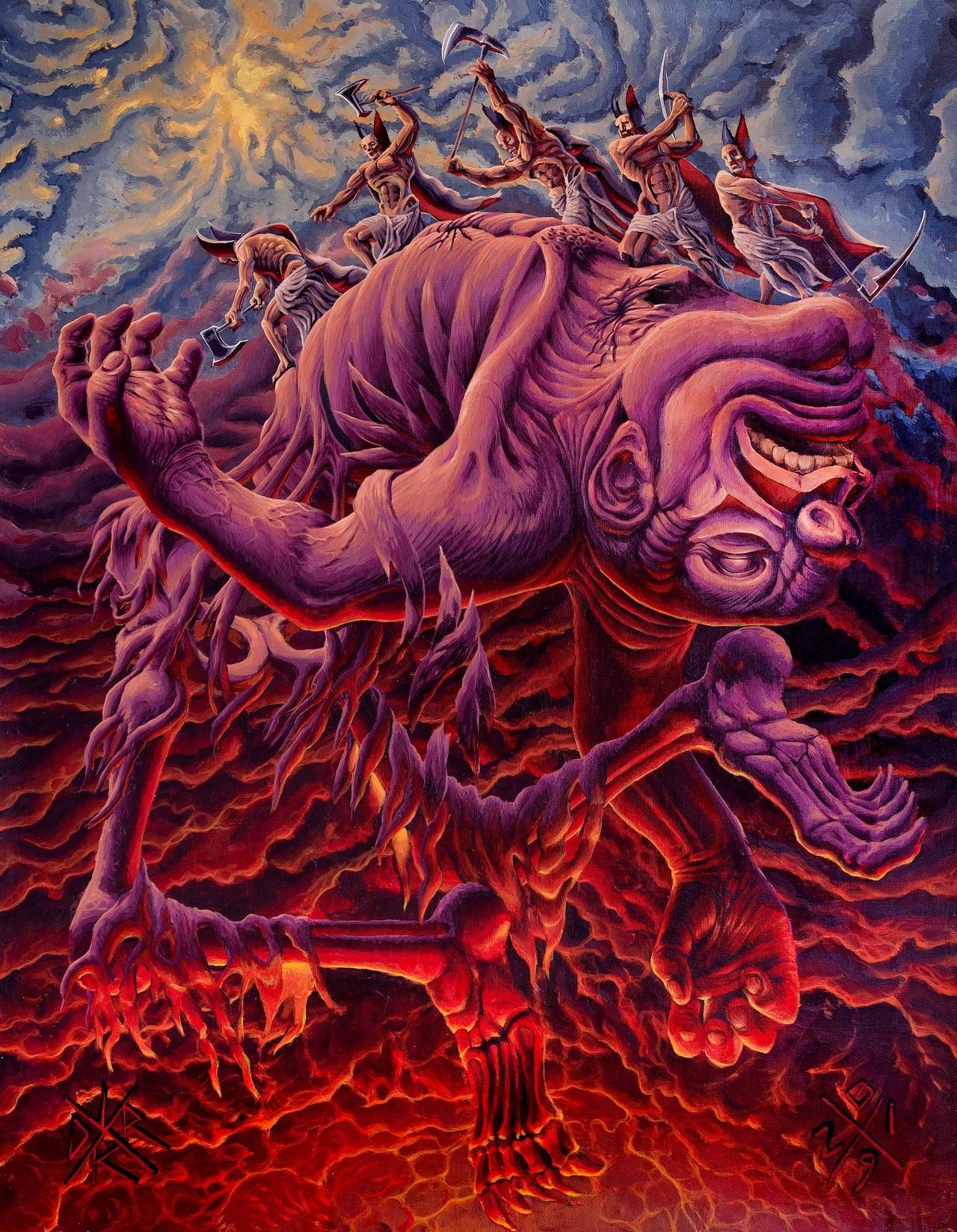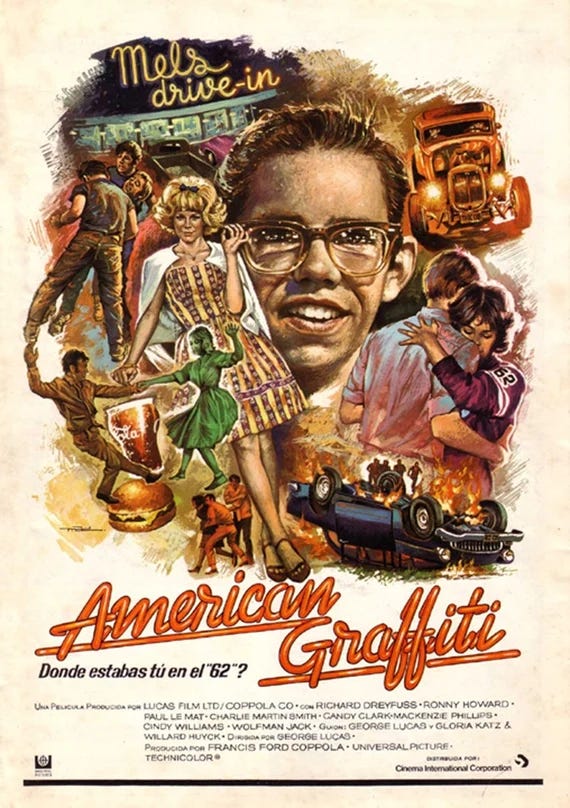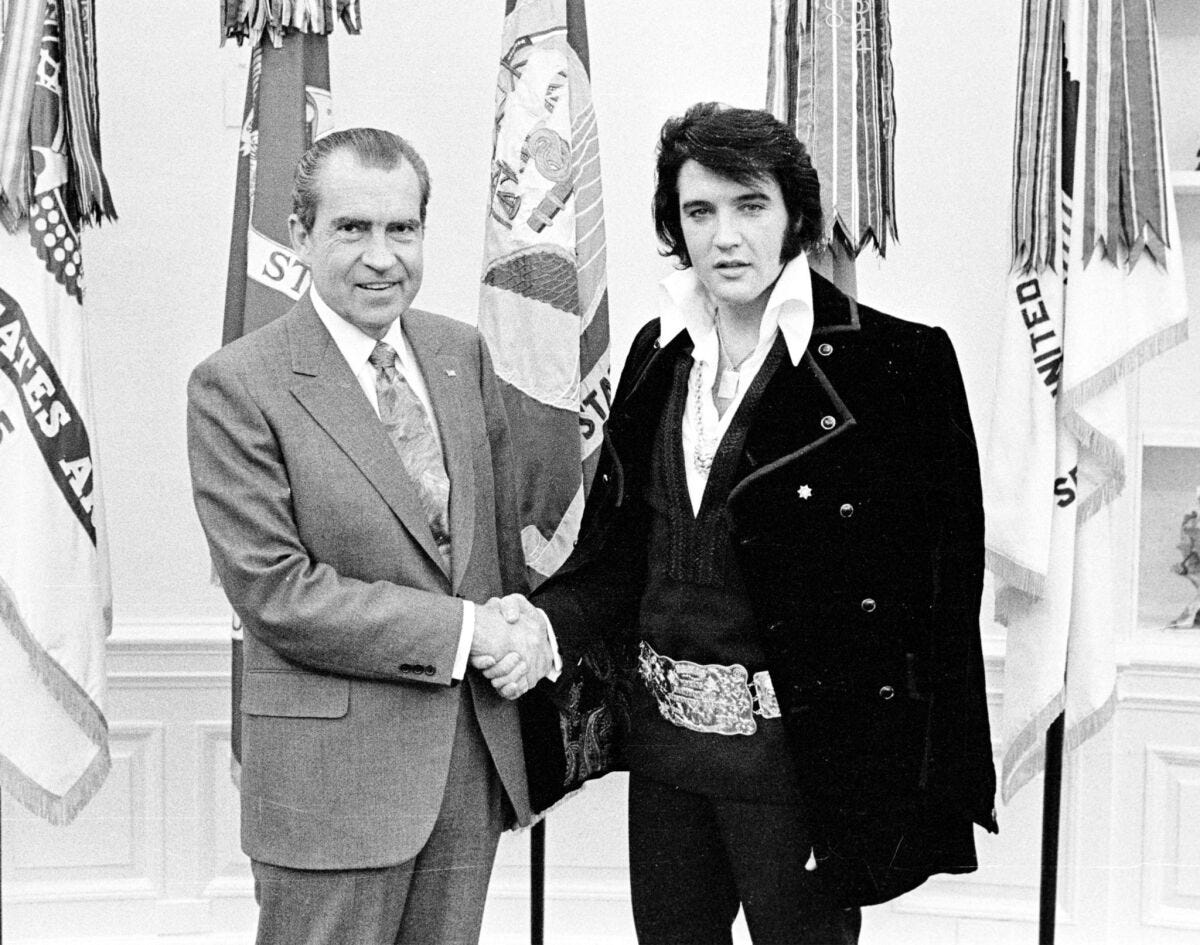(An audio version of this article is available for paid subscribers).
Q: What does it mean to ROCK?
I. Ok, Let’s Rock.
I hesitated on writing an article in response to this prompt.
Rock music is not my usual area of concern (even though my model of the religionization of cultures is deeply engaged with genres). Rock does not seem notably spiritual. It lacks the celestial clarity of Mozart, the improvisational soul of Jazz & the tragic divinity of the Blues. Rock is more cultural and physiological than uplifting and clarifying. Still, there may be some intriguing tangential streams that we could explore together.
One obvious connection is the resonance between the high-engagement, triumphal & rebellious Spirit-of-Rock and the (from my point of view) underemphasized concept that our spiritual practices should also “rock.”
This is a strongly debated premise.
Should good psychotechnologies make you feel uniquely, individually & even erotically empowered — or should they move your consciousness beyond all such considerations? Do peak experiences, and the feelings of inner growth and empowerment, represent a problematic persistence of self-identification and striving or are they the very essence of the divine process?
I have tremendous respect for the so-called dry path. In a mundane commercial culture we are always being solicited toward distraction, arousal, personalization and indulgence and so we must specially guard against a materialistic approach to spirituality. And in order to gain mind-strength & self-knowledge we have to challenge our immediate superficial responses and evaluations. That means that inner practice may require you to tolerate boredom and merely witness your sense of hungry insufficiency.
There is even a certain kind of self-awareness that arises only when you impersonally inspect your own thirst for engagement. To experientially gain that particular meta-perspective, you must undertake a discipline that interferes with the ordinary and automatic tendency to re-adjust ourselves in the direction of excitement.
Good.
I agree.
Yet, there is also an epidemic lack of juiciness in many spiritual practitioners. And sometimes a strange, pro-dullness attitude can permeate our lineages. Many people emerge from years of psychoanalysis with their neuroses still intact and many more folks emerge from decades of meditation with very little gain in authenticity, energy, beingness & unique insight.
Their spiritual lives did not ROCK. And perhaps they were even told quite explicitly that they should not seek, or value, such qualities. Calm down. Sit still. Put aside all goals. There is no method. Witness your emotions but do not engage them. Work for a neutral state of non-seeking that does not trouble itself about depth, happiness or creative capacity. The Ultimate Way does not care how you feel. After all, what is… simply is.
Yet it is notoriously easy to gaslight people with this logic. I love cults but I hate cultic vibes (in spirituality, politics or families). And cultic vibes often start off with the “helpful advice” to stop listening to your individualistic hunches and somatic urges. It is troublingly easy to end up in mass suicide events, or in desiccated polygamous enclaves, when you start associating spiritual improvement with the rejection of your organism’s needs.
And, frankly, is there any special reason why total radical consciousness should not feel (as they used to say in the 80s) totally rad?
II. The Weird History of Rock
There’s a cryptic line from Aleister Crowley’s hilarious and notoriously Horus-oriented revelation text called “The Book of the Law.” It goes like this:
I am the warrior Lord of the Forties: the Eighties cower before me, & are abased.
Liber AL vel Legis III: 46
Could it be prophecy? Maybe. The emergent Rock-and-Roll music of the 1940s did in fact become terrifyingly dominant as the ROCK music of the 1980s. Just rock? That’s right — no one is sure what happened to Roll. Police are still investigating her mysterious disappearance. The family has not given up hope.
However, in Roll’s absence, the newly electrified & hyper-fertile body of Rock (much like the primal transexual Norse giant Ymir) self-spawned into countless mutant subgenres such as hard rock, soft rock, prog rock, punk rock, folk rock, psychedelic rock, rockabilly, etc.
I remember.
I was a young North American kid in the 80s when street philosophers still argued, inanely about which audio cassette tapes really ROCKED! When I was just a wee thing, adults took me to see the yuppie time-traveler Marty McFly perform Johnny B. Goode to a stunned high school audience in a 1950s gymnasium (before hopping into his wing-door’d DeLorean and travelling Back to the Future.)
In those days, the word “Rock” was used so ubiquitously in North American culture that it was hard to know what anyone meant by the term. Nobody explained it to me. It just was just O.G. vibe culture. Anthemic. Super-charged. A trashy, coked-up mating call exchanged between late industrial civilization & the newly embodied intersubjectivity of the electrical machines.
The acoustic equivalent of nuclear power.
Even if you preferred jazz, disco, hip hop, Sufi wailing or classical symphonies, you could not deny the simultaneously childlike & manifesto-like quality of a neo-tribal “band” who knew how to weave drums, guitar riffs and banshee vocals into a concentrated stream of rockingness that was somehow equally appropriate in mega-stadiums, drunken strip clubs and family-friendly, drive-time radio programming.
The omni-applicable cultural energy of Rock was fully confident about its ability to blow the roof off the residual puritan morality of small-town Protestant America while also undermining Soviet totalitarianism, dissolving the cultural segregation of whites & blacks and, in the very same move, undoing the psychophysiological segregation of pelvises & heads.
A crazed engine was being turned on.
The video linked above — I WANNA ROCK by Twisted Sister — was possibly the first song I ever heard in which the concept of Rock was explicitly invoked. It certainly presented the first transvestite anarchists that I had come across.
Singer and motley jester, Dee Snyder seemed to be suggesting that masculine rebellion, amplified energy and exaggerated women’s eye make-up were perfectly compatible. I instinctively agreed. Although I was pretty cis-het, I had a shamanic intolerance for the village’s utterly inapplicable, to me anyway, “inherited gender norms.” (We’ll get back to the shamanic dimension at the end of this article when we consider the plight of Elvis Presley — the so-called King of Rock and Roll.)
At the time, I just lapped this stuff up like every other young idiot exposed to manipulative cultural content. In hindsight, I am more skeptical. Was rock music really as rebellious as it claimed to be? As I cast my gaze back through time, it appears, actually, that Rock was widely corporately-endorsed and pretty acceptable at all levels of power.
Even its performative critique of stodgy attitudes within the suburban heteronormative cultural paradigm was still oddly benign, business-friendly and basically tolerable to the media gatekeepers. Politicians rocked out. Lots of blue jeans, Ford trucks & carbonated sugar water were getting sold.
Most rebels of all kinds, of course, turn out just to be in the early stages of conformism. Usually you can tell easily because their rebelliousness looks pretty conventional. They rebel in the predictable ways. These self-loathing joiners start using the standardized “anarchy” symbols and adopting the socially-promoted archetype of the rebel.
So was Rock music a sign of real historical transformation or was this Boomer rebellion just the same old standard social conformity dressed up in wannabe shamanic costumes and armed with electrified guitars?
It’s an open question.
I have heard it said that the initial riff from Led Zeppelin’s Good Times, Bad Times was the opening salvo of the 1970s. Shots fired. And, yes, that song, that album, that band, definitely rocks. Weirdo occultist and guitar-god Jimmy Page specialized in riffs-that-rock. But Zeppelin was not the only sonic omen of the 70s.
American Graffiti (1973) was perhaps the opening salvo of what Ken Wilber called “boomeritis.” A huge hit movie in which the young, avant-garde filmmaker George Lucas sold out (and cashed in) with a nostalgic, triumphalist paean to ultra-basic culture with a combination of pop-friendly remixed retro rock, teenage idiocy & consumerist automobile fetishism.
A new generation of adult, post-war workers-and-purchasers wanted self-flattering films to make them feel good while still pretending to be rebels against the early modernist generations. People who had been playing at hippie freedom for a few years were now ready to reactivate the 1950s agenda and move into the positions of economic & political dominance that they would hang onto for the next half-century.
This is not a blanket critique of a generation. Some of the best humans ever were “boomers.” Still, we must be capable of a critical attitude that considers the possibility that Rock music was part of a faux-rebellion that blurred the line between new values and old values — allowing many people to socially renormalize under the cover of a merely superficial and commercial aesthetic of transformation.
Director George Lucas himself went on to great fame by creating the Star Wars — a new corporate retro-myth about a whiny, naïve hippie (long hair, lose clothes, mystical, weird friends, constantly espousing rebellion) who faces his own urge to become the mechanical pseudo-man upon which the entire imperial system depends.
Full disclosure: I was an enormous Huey Lewis fan when I was around 11 and largely agree with Christian Bale’s bloodthirsty lunatic evaluation from the film American Psycho:
III. Why Did Nietzsche Claim That Bizet Rocked?
Pre-20th century evidence for Rock is pretty slim. We could facetiously argue that the first reference was in the Bible. Jesus nicknames an uneducated fisherman, Simon, with the word “Peter” — Greek for Stone. This guy had rocks in his head. It’s true. Read the Gospel. Peter is usually the idiot foil to the Lord’s wise pronouncements. He plays the blockhead who draws out the teachings by not getting the point.
Peter: Should I really forgive my brother or sister if they upset me?
The Lord: Yes.
Peter: But what if they upset me again?
The Lord: Obviously, keep forgiving them.
Peter: Okay, but what if they upset me, like 7 times?
The Lord: Listen you rock-headed yokel, I don’t care if it is 70 x 7 times! You just keep your heart open!
Apparently he built his church on that rock.
Anyway, after the Bible the next big mention is from St. Nietzsche. Most people have heard of Nietzsche but not actually read him in any depth. And those who have, for some reason, still do not usually read The Wagner Case — Nietzsche’s hyperstylized philosophical analysis of music from the perspective of health & wisdom.
That is still a pretty unique perspective to bring into the topic of music. Put aside the obvious, all-too-obvious, fact that people have different subjective preferences for music. And while you are at it, put aside the question of how talented (or even how much of a “genius” someone is). If you can bracket those issues, then we could start to explore whether this or that form of music is… good for us.
Just because you love a piece of music does not imply that it’s not contributing to your depression, mania or dysfunction. People claim that Mozart is good for the brains of babies. And maybe you have seen the evocatively dubious Masaru Emoto images of how music affects water crystals. Yet it remains difficult —and was even moreso in 1888 — to think about music in terms of its cultural health effects.
Nietzsche got into this slippery philosophical problem because he admired his friend Wagner & loved that man’s rebellious pop symphonies. He praised Wagner as a legitimate musical genius. Yet Nietzsche was nonetheless exquisitely sensitive to the culturally problematic effect that he thought this music was having on emotionally armored, psychologically malnourished, neo-romantic, young Germans.
He said that Wagner’s music does not treat the listener as intelligent. It is a swamp bully. A murky, thundering and seductive totalitarian. It acts, postures and evokes but does not take general coherence & well-being into account. And although it is insipid to play the guilt-by-association card, we cannot help noticing that a similar critique can be levelled against Mr. Adolph Hitler who styled himself as Wagner’s greatest fan. I apologize for mentioning it.
What Nietzsche tries to do in this odd little booklet is to explicate the culturopathic elements of acoustic style. And he does this by contrasting Wagner against Bizet’s Carmen.
In Bizet, Nietzsche sees the seeds of an antidote to the moody, manic-depressive, romantic & deeply uncharitable overwhelm of Wagner’s approach. It is clear, Nietzsche says, why Wagner’s early attempts at a culturally-revivifying return to myth, sensuality and subconscious intelligence end up in Parsifal — an idealized, pseudo-Christian, special effects opera about chastity and self-abnegation.
The revival of cultural health & wisdom, according to Nietzsche, would require a different set of qualities in order to counterbalance the hidden perversion deep within modernity’s covertly nihilistic attempts at progress and revolution.
Here are some of the qualities that he singles out. The new music should be:
Southern (i.e. African). Warm. Halcyon. Martial (i.e. mobilizing drums and dash of confrontational aggression). A mixture of innocence and wickedness. And a return to the Dionysus chorus. A happy, empowering and challenging form of music infused with aggression, drums, suspicious innocence, physical confidence, a dancing irony & deep African rhythms.
Rock music.
“One must still have chaos within oneself to give birth to a dancing (rock) star.”
- F. Nietzsche
Sounds great. The man might have been a prophet. But did these new rock’n’roll qualities succeed? Or did their rebellion succumb to the same problem it was hoping to correct?
That brings us to Elvis…
IV. The Patriarch’s Shaman
What did the world see in Elvis Presley?
Sure, he had a great voice. But so did Roy Orbison and people don’t walk around claiming that Roy is “the king” or that he is “still alive.” Elvis had mythic potency. Whyso? Well, he certainly embodied Nietzsche’s prophecy:
He was (whether we think he did it with adequate cultural respect or not) the epitome of Euro-African fusion in the mid-20th century. He was physically confident. Aggressive in his movements. He asked people to open their bodies and receive the energy flow of the Black Gospel wisdom which tells us that the Dionysian God-who-Redeems-Tragedy is available through immersion in wild cultural forms accessing a background sense of good cheer & power that transfigures human suffering.
The reason that Elvis could pull this off was because he, like Nietzsche, was deeply entangled with what we might loosely call the shamanic dimension of human life — but that is not the reason we all know about him. We know him because he was super-useful to the power structure. He was a cudgel with which the liberal-modern authorities could beat back the traditionalists. Speaking fantastically, they took a rural American shamanoid, put him in a cage and broadcast him around the world until he was drained, deranged and destroyed.
The opening sequence of Bahz Luhrman’s The Tragedy of the Shaman Elvis Presley (sic) shows the Presley child simultaneously experiencing the blended quality of religious music & transcendental erotica. You will notice in that trailer (linked above) that Tom Hank’s character, Colonel Tom Parker, an elderly, loveless and broken pseudo-wiseman — now serving as a Social Recapture Agent — says that Elvis “the man” was sacrificed and Elvis “the god” was born.
I disagree.
It looks to me like Elvis the potential god-man was sacrificed so that Elvis the socially useful man could be born. Elvis was a failed shaman. I am not saying that to put him down. I want to point out that our system of culture, economics, ideology & technology fails our shamans. Elvis can be read as a particularly potent and vivid example of how the “shamanoids” can be suppressed even by their success.
Wait a minute — on what grounds would I argue that Elvis was a shaman?
Well, the discourse of metashamanism that I have been promoting, is not looking specially at folks who play official shamanic roles within indigenous traditions. That’s included but not privileged. Rather we are looking at the broader picture of how shamanic traditions are generated & regenerated. What are the characteristics of the type of people needed to populate those traditions? What are the variations within and between them? What principles facilitate complementarity between these variations? Can their processes be articulated differently or newly? And what role do we need them to play, individually and collectively, on the planetary stage during the strange disruptive Age of the Metacrisis?
From this point of view, I would make the following observations about Mr. Presley. He appears to have:
performed a mediation function between different tribal populations (black/white, young/old)
instinctively worn bizarre, elaborate and ceremonial costumes
was obsessively interested in whatever eroticism & religion have in common
specialized in public transmissions of “subtle energy”
wore make-up & other feminized decoration choices suggesting a basic indifference to prevalent roles and gender norms
experimentally studied the effects of sound vibrations on groups of human minds
(in his later drugged phase) obsessively explored altered states of consciousness and experimentally tried to gain skill in the use and mixing of medicines
was driven to put on ceremonial regalia and offer “perplexing advice” to the reigning chieftain:
The tragedy of Elvis — from the metashamanic point of view — was that the unfolding of his skill-set was narrowed, starved & exploited.
Many people with shamanic tendencies destroy themselves because they cannot regulate their sensitivities. Many others are destroyed by a social system that refuses to recognize them. Elvis is in a third category.
He was healthy, powerful and detected by the villagers. Then he got “captured” by the modern economic control structure. Yes, it made him rich and famous. We are not here to pity dead, wealthy celebrities. However, we should be attentive to his famous depression and dis-ease. Could it have been a sign that he lacked the understanding, support and opportunity to explore his peculiar organic potentials? Does his unmentored struggle epitomize what can happen to many instinctive shamans and witches in our civilization?
Elvis’ ability to sing, and demonstrate himself publicly, were hyper-incentivized and then mined by American record companies & movie executives in ways that (a) prevented him from expanding his shamanic repertoire, and (b) left him increasingly deprived of purpose and energy.
He was emotionally undermined and progressively blocked from life-giving contact with peers & elders. Paraded. Isolated from the avant-garde. Vampirically drained by processes that exhibited no respect for his needs and sensitives. They turned him into a parody of himself, crying out for help from people with no ability to hear him and no incentive to help him.
And, arguably, his commercialized prominence contributed to a cultural confusion in which many young people who lack shamanic instincts nonetheless try, often dangerously, to imitate them because they appear connected with fame, fortune & sexuality.
Our global village might need global shamans, yes, but that is something more than just globally famous actors, artists, rock stars and drug addicts who “move product” while helping Caucasian teens learn to wiggle their hips.
I’m not blaming Elvis or saying that there’s anything wrong with making money or wiggling your hips. What I am saying is that our civilization has been chronically failing to anticipate, recognize, support, promote and enable co-training (and healthy elder training) in the people who might be our much-needed esoterics, shamans, witches & custodians of sacred ritual.
I am very fond of Elvis. His virtuoso eruption of electrified & anglicized Blues gave us the quintessential, mid-20th century blurring of racial boundaries in music and evoked courage and confidence in the excitable, mobilist bodies of domesticated white populations. But what else could he have been? What might we have collectively lost by treating him as a mere rock star — and slowly draining the life out of him?
And with that open-ended inquiry, I shall bring to a disorienting conclusion this now overly long exploration into four philosophical tangents to the Spirit of Rock.
PS.
Have we mentioned any women at all?
For the sake of sheer perversion, here’s an aging male rocker mansplaining the best female rock.
And below is Joan Jett’s trans-punk classic I love Rock’n’Roll :










